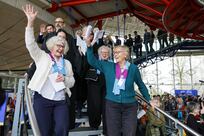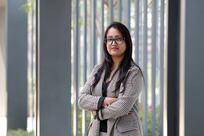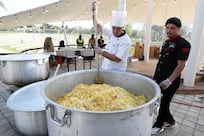DUBAI // Almost 400 mosques were built in Dubai between 2008 and 2012.
As of the middle of last year, there were 1,418 mosques in the emirate, up from 1,043 in 2008.
The figures come from a report by the Dubai Statistics Centre and the Islamic Affairs and Charitable Activities Department in Dubai (IACAD).
Construction was at its highest between 2008 and 2009, with 331 mosques opened.
Since then the rate of growth has slowed with 23 built between 2009 and 2010, 19 between 2010 and 2011 and only two from 2011 to the middle of last year.
"As Dubai has grown in terms of becoming a business and tourist hub, there has been a requirement for the infrastructure to catch up," said Abdul Malik, the manager of the Al Farooq Mosque and Islamic Centre off Umm Al Sheef Road in Jumeirah.
"You only have to see how busy it gets during prayer time to know that the demand for these facilities is there, and probably means more could also be built."
Al Farooq Mosque, a Dh100million replica of the Blue Mosque in Istanbul, opened in July 2011 and was privately funded by Al Habtoor family.
Philanthropists play an important role in supporting the building of mosques in Dubai, with citizens paying for 499 of mosques in the emirate.
The IACAD has overseen the building of 495 mosques. The rest were built through various public and private bodies, including the police and Islamic community groups.
The report also found that the vast majority of new mosques were located in Deira and Bur Dubai, with 438 and 633 respectively. Rural areas accounted for the rest.
The distribution of mosques is an issue for many people living outside of Dubai's older neighbourhoods as the city continues to grow.
"There is one mosque in The Greens and you see people coming across from Tecom to use it during prayer time, especially on Fridays," said Imran Mustafa, from India, who lives in the area. "The problem you have is that with so few options nearby, the mosque does get overcrowded and people park anywhere they can find a place to stop."
He called for better planning of mosques in new Dubai with car parks to prevent double parking.
According to the report about 12 per cent of the mosques in Dubai have a capacity to handle more than 1,000 worshippers.
More than a third of the buildings have a capacity for only 100 people, with those that can accommodate between 200 and 400 people making up about another third.
"Dubai's mosques are divided into two main categories: mosques that host Friday prayers [in addition to regular prayers] and mosques that host only regular prayers," said the report.
"In mid-2012, the number of mosques that hold Friday prayers amounted to 507 - 35.8 per cent of Dubai's mosques; while the number of mosques that do not host Friday prayers was 911 - 64.2 per cent of Dubai's mosques."
The report also looked at the roles of mosque employees and found that there were 41 preachers across the city.
There were 339 imams and khatibs, who deliver Friday sermons, 252 muezzins who perform the call to prayer and 109 maintenance staff as of the middle of last year.





